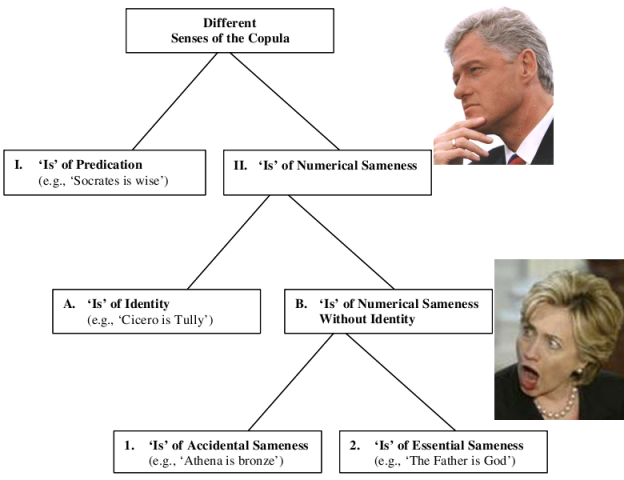Reply to a scoffing “monarchical trinitarian”
A blogger mocks the UCA as “the Unitarian Confusion Alliance.” But on what basis?
A blogger mocks the UCA as “the Unitarian Confusion Alliance.” But on what basis?
Is E.J. Lowe’s four-category ontology the key to solving the multiple-natures and multiple-modes problems?
Is “monarchical trinitarianism” theologically viable?
A summary of Dr. Branson’s case and an argument against biblical unitarian theology.
What does “monarchical trinitarianism” include exactly?
Weighing incompatible definitions of trinitarian theology and unitarian theology.
Four authors summarize their views on the Trinity.
Does Inspiring Philosophy’s Michael Jones have a Trinity theory?
A prolific apologist embraces so-called “monarchical trinitarianism,” on which the one God just is the Father, not the Trinity.
Does a doctrine of divine processions entail that the Son is less divine than the Father?
Was 381 the dawn of imperially enforced confession of a triune God?
A new paper on when and how the biggest change in the history of mainstream Christian theology occurred.
Is my definition of the concept unitarian so wide that it would allow in some famous trinitarians?
In the New Testament “God” is nearly always the Father. But what follows from that, exactly?
Is the Son God? In the immortal words of Bill Clinton, “It depends on what the meaning of the word ‘is’ is.” Brower and Rea suggest the following classification of meanings of “is” (in logic, “is” is called “the copula” – that which connects the subject and what’s being said of that subject).

Um, no the Clintons aren’t in the original chart in their paper (71).
And yes, Bill is intrigued by the word “copula”. Read More »Constitution Trinitarianism Part 3: The Meaning of “Is”
Brian Leftow is recognized as one of the most important living Christian philosophers. Formerly of Fordham University in NYC, he now holds the prestigious Nolloth Chair of the Philosophy of the Christian Religion at Oriel College, Oxford. See Trent Dougherty’s comments here for a list of some of his publications. In person, Leftow is very pleasant and interesting, and his sense of humor also comes… Read More »Leftow 1: “Anti Social Trinitarianism”
Is Ned in trouble? Here’s a quick post to wrap up the series on Brower’s and Rea’s constitution theory of the Trinity. First, it’s striking how original and self-consistent their approach is. It is rare to find something this new, and this well thought through on such an old topic. They’ve carefully carved out a unique position, one which has a motivation outside of theology… Read More »Constitution Trinitarianism Part 6: summing up
JT Paasch is a graduate student at Oxford, he’s originally from Utah. He earned a M.Div at Trinity Evangelical Divinity School (under Kevin Vanhoozer), then went to Oxford to work with Richard Cross on medieval trinitarian theology. His doctoral thesis is titled ‘The Logic and Metaphysics of the Trinity according to William of Ockham’. I’ve appreciated his thoughtful comments on some of my posts here. I thought the following one was post-worthy.
Be sure to check out his blog, the title of which is either (1) contradictory, or (2) an example of English (or Utahn?) dry humor. I say the charitable interpretation is (2). 🙂 – Dale
In the traditional western view of the trinity, e.g., as the likes of Augustine and Aquinas think, the divine essence basically functions as a nature. Read More »Guest post: JT Paasch on constitution trinitarianism
In the same issue of Faith and Philosophy (22:1, Jan 2005, 77-86) Bill Craig has a critical response piece. (Available online here.) First, he gives a nice and clear summary of their article, more complete than the one I gave last time. Then he proceeds to object. As with most philosophical theories, when you start objecting, things start getting complicated, and you start to understand the theory in question better.
For starters, what do they mean by “the divine essence”? What sort of thing is this which constitutes the persons? Rea answers in an email which Craig quotes:
All we mean to commit ourselves to is the idea that maybe the Persons are like a hylomorphic [form plus matter] structure: there’s something…we call it the “divine essence”… that plays the role of commonly shared matter, and, for each Person, something else that plays the role of form. (80)
Read More »Constitution Trinitarianism Part 2: Craig’s objections
The next theory up to bat is by philosophers Mike Rea of Notre Dame and Jeff Brower of Purdue University. In some ways Mike reminds me of his mentor Al Plantinga – a tall guy you don’t want to argue against unless you absolutely have to. He’s published many articles in metaphysics and philosophy of religion, and is perhaps best known for this book. He’s presently editing several books, including one of recent essays on the Trinity, which I’m really looking forward to seeing. Jeff is one of the best medieval philosophy specialists around, focusing on metaphysics, philosophy of religion, and ethics. I think he has excellent tastes in medieval philosophers. Both of these guys are top-notch, and you’ll always learn a lot from anything they publish. Both of them, by the way, have many papers available to download from their websites, and their other Trinity work will surely be discussed here at some future date. The one I’ll be discussing in this series is here. Theirs is a bold and controversial theory, and one which is quite out of step with the Social Trinitarian views that have been so popular of late.
“Material Constitution and the Trinity” (Faith and Philosophy 22:1, Jan 2005, 57-76) is a difficult and technical article, dense with argument. Philosophers will appreciate how well it’s crafted; I not sure many others can get through it! Here I’ll just lay out the broad lines of it, getting slightly more precise in future installments. Consider Ned the gnome:

How many things are pictured here? Read More »Constitution Trinitarianism Part 1: Ned and Lumpy